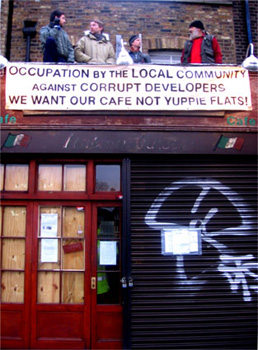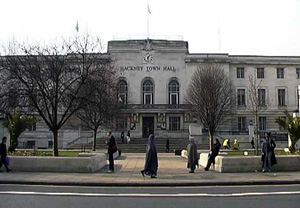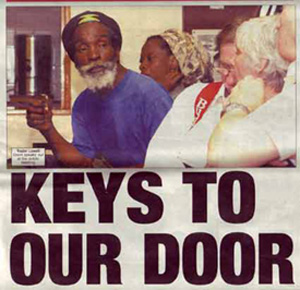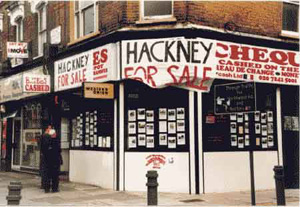The Re-Occupation
In protest against evictions, sell offs and corruption in Hackney east London, a group of locals, activists and squatters this week reoccupied a café, successfully preventing its demolition by developers. Anthony Iles reports on this unusual counter-attack against the neoliberal ‘regeneration’ of the city
Broadway Market is a victorian street in Hackney, an increasingly fashionable borough in the east end of London. The street runs picturesquely from London Fields down to the Regent’s canal. A short stroll from the trendy bars of Hoxton and Shoreditch, over the last few years it has developed its own rash of middle-class boutiques, delis and gastropubs. While some celebrate the gentrification-fuelled ‘rebirth’ of Broadway Market and the consolidation of its ‘brand identitity’ with the advent of an organic farmer’s market catering to inhabitants of the area’s mushrooming yuppy apartments, less affluent residents have mainly been victims, not beneficiaries, of this striking transformation.
The locals, however, have not taken the process lying down. Demonstrations and protests accompanied earlier phases of the re-colonisation of Broadway Market, with local people and activists protesting the notoriously corrupt Hackney Council’s attempt to sell off its assets to the lowest (and most corporate) bidder. Although much of the damage has been done, people’s anger toward the council and the private interests they seem to serve has only intensified.
This week the struggle against the top-down ‘regeneration’ of the area took a new turn. On Sunday 27 November a group of locals, housing activists and experienced squatters moved into number 34 Broadway Market, a building which until 4 months ago had been the home of well loved local institution, the Francesca Cafe. The previous tenant and for thirty years proprietor of the cafe, Calogero ‘Tony’ Platia was evicted on 1 July 2005. The grounds for this were dubious to say the least. Tony was well known in the local area, was up to date with his rent and remained a valued part of the neighbourhood. Like other long term, now long gone, businesses in the street, the café had definitely suffered in the previous decades as local manufacturing industry moved out, but the influx of expensive upscale boutiques did at least bring the cafe new customers. Tony had plans for the café and it looked like maybe he just might get something out of the supposed regeneration of the area after all.

However, Tony’s chances of benefitting from the gentrification took a nose dive with the sell off of council properties in the street in 2002. To pay off its £70 million debt Hackney Council auctioned hundreds of its properties in the area including schools, playing fields, nurseries, doctors surgeries and retail units. Along with numbers 2, 4, 6, 30 and 32 and the land to the rear of numbers 26-36 Broadway Market, the Francesca Café became the property of a single developer, Dr Roger Wratten. Tony’s new landlord was even worse than the council and it soon became clear that he was on a mission to oust Tony. The circumstances surrounding Dr Wratten’s purchase of the Café are suspicious and currently under investigation; despite the fact that Tony had first refusal on the property and repeatedly tried to buy it from Hackney Council, he was passed over in favour of a wealthy developer. Wratten continued to press for Tony’s eviction from the premises and, after three attempts during which local people rallied to Tony’s defence, in July 2005 the bailiffs, supported by an army of 50 police, succeeded in throwing him out.
The reoccupation of the café this week under the banner PROTECT BROADWAY MARKET FROM CORRUPT DEVELOPERS! WE WANT OUR CAFE NOT YUPPIE FLATS!’ is already receiving considerable support from local people and has managed to send a clear message to the council that some people are not happy about the way Broadway Market is being regenerated. The new occupiers of the café have successfully halted the demolition (for now at least) and seem to have produced a major shift in the way Hackney Council view Wratten’s purchase of the building and ajoining land. A judicial review of the highly suspect process by which Wratten acquired the property from the council is now going ahead and the council are preparing their responses.
While such a highly organised coalition of locals, activists and squatters in defence of a small neighbourhood business may be unusual, it is clearly about more than just taking back a local asset for the people of Hackney. It can also be seen as a symbolic blow against the wider programme of state-sanctioned looting which currently besets communities across the UK. To understand why the eviction and threatened demolition of this small café provoked such a strong response one has to go back into the rich history of corruption, swindles and sell-offs that have been going on in Hackney since the 1970s.
Hackney Council Corruption
The following quotes reveal the background to the neoliberal carve up of Hackney in more detail:
'In the mid-1990s Hackney Council assured its client base that the Council had overcome the financial difficulties and corruption which had plagued the borough for many years. The borough's Auditors woke up one day and decided that they had a job to do, so they audited the accounts. When they did so, they found to their surprise that there was an unexplained £17 million black hole in the budget. A closer examination of the books found that the £17 million black hole was a chasm amounting to £72 million and the government were not happy that, having recently gained power, one of their Labour Councils had soured their victory.'Hackney gets ripped off again, http://www.hackneygetsrippedoff.blogspot.com/
The message was clear, the government was not going to bail out Hackney Council, instead they advised the council to sell off its properties. Believing, rightly or wrongly, that they had no other choice, the councillors did just that. Whilst this strategy mirrored the standard policy of London councils in auctioning commercial properties off throughout the 1990s, as mentioned above, Hackney also sold off a host of other public facilities and resources: 'school buildings, nurseries, buildings used by voluntary groups, green spaces, garages, public toilets, houses and shops, all have gone under the hammer.' ‘Hackney not for Sale’, http://www.schnews.org.uk/sotw/hackney-not-4-sale.htm
'The estate agents appointed by the council, (Nelson Bakewell tel: 020 7544 2000), have sold £225 million worth of properties for just £70 million, with the majority of these going to wealthy off-shore cartels who have made an absolute killing at the expense of the people of Hackney.'
'A local lawyer has been researching the background to several of the sell-offs in Broadway Market and claims to have found several cases where the council has been involved in doing deals with developers behind the back of shopkeepers who could have bought their leases. He has been taking the council to task but has not managed to get any straight answers from them in response to his allegations.'Hackney Independent, http://www.hackneyindependent.org/
Residents Meeting
'[At a recent public meeting] representative from the Dalston area updated people about the recent sell-off of Dalston Lane properties. It seems that these were carried out in the same way as the 2001 Broadway Market sell-off - local shop keepers were sidelined by property developers who were given preferential treatment by the Council's estate agents. The meeting was told that Nelson Bakewell sold an entire parade of shops on Dalston Lane as a job lot for almost half their total combined asking price to an overseas developer that already owns 10 properties in Broadway Market.' Hackney Independent, http://www.hackneyindependent.org/content/view/170/2/
Beyond Broadway
As these quotes suggest, the reoccupation of Tony’s café this week is only one link in a chain of struggles against avaricious developers, corrupt council officials and the various agencies whose chaotic interactions neverthless add up to a sustained and systematic effort to hand over the remains of the welfare state to big capital. There have been marches, protests, meetings, demonstrations outside auction rooms and in the Hackney Town Hall square. The more radical character of this week’s action suggests how tired the community has become of the council’s unresponsive attitude to more conventional protests. The support it has garnered from the many people in the area who have experienced similar treatment in the name of ‘improvement’ and ‘renewal’ suggests the possibility of such actions spreading beyond Broadway Market. Among those supporting the reoccupation of the café are council tenants fed up with seeing local shopkeepers bullied out of their premises but also fighting back against the council and government's stealth privatisation of their own homes through the transfer to 'social landlords' or Arms Length Management Organisations. A more or less intense version of the intimidation experienced by Tony Platia (his cafe was mysteriously firebombed during the period before his eviction...) is familiar to many of those in council estates who do not vote ‘the right way’ when the time comes for them to choose between the continuing dilapidation and privatisation of their homes.

It would seem that the story of the Francesca Cafe is not so much exceptional as characteristic of the way 'renewal' takes place in inner city areas like Hackney. Coercion, corruption, and the direct or indirect manipulation of the existing community by state and private interests is rife. This is not news for the poorer inhabitants of Hackney, of course. On Broadway Market there is a strong awareness of the stitch up the council has been orchestrating. On the other hand, some of the opposition to this process has been rather narrow. At a previous public meeting called by the Broadway Market Traders & Residents Association and led by Tory Councillor Andrew Boff, plans were tabled to protect the 'local community' of residents and traders from further sell-offs and particularly to prevent corporate businesses such as Starbucks moving in. However, the interpretation of the term ‘local community’ offered here seems limited to the middle class customers and owners of Broadway Market's posh cafe's and furniture shops. As Hackney Independent astutely states: 'Ultimately the [new crop of] shopkeepers want to be protected from the excesses of the free-market whilst enjoying its immediate benefits.'
Ironically, one of the bodies that managed the sell-off of Hackney Council's properties, Renaisi, recently used a photograph of Tony taken when he was still running his café to lend credibility to their Invest In Hackney website. Despite the brazen conscription as promo fodder of the very people their plan for the area is squeezing out, it is clear that the form of 'investment' Renaisi promote is closer to the military sense of the word than the economic one. Although precious little money goes to revitalising businesses like Tony’s, behind the smiling face of 'urban renewal' presented on the website the commercial equivalent of ethnic cleansing goes on apace:
‘While many locals are pleased to see the street become more active, they also recognise that many of the new shops and initiatives are not for them but for wealthy newcomers to an area that has suddenly become trendy and desirable. Tony’s was a place frequented by a broad cross-section of the community.
What has happened in Broadway Market is part of a general attack on local people in this area. Many are sick of being treated like 2nd class citizens, having their local amenities closed (Haggerston Pool), their estates run down or privatised, their schools demolished and handed over to big business (Laburnum School), and publicly-owned property handed to developers for a pittance.'
[From the occupiers' Press Release]

Resurgence of 'non-owner' occupiers
While in recent years it has been increasingly difficult for squatters to find empty properties or occupy them for any length of time, property prices and the lack of council or housing association housing have driven a great number of people into precarious short term leases or para-legal tenancy. The arrival of occupation manager Camelot in Hackney (who intercede between licensed occupiers and landlords, extracting rent from both bodies) has also closed what for many was the last option for affordable housing in London. So while squatting as a lifestyle dips over the horizon, it is increasingly a neccessity for many and can still be a strategy in the ongoing struggle against the destruction of public space and public property.
In 2001 the group Hackney Not For Sale set up a spoof estate agents to lampoon the sell-offs by Hackney Council. Last week an inspiring historical parallel with this tactic could be found in the recent obituary of housing activist Tony Mahoney. Mahoney had been central to the preservation of Fieldgate mansions, several blocks of Victorian flats earmarked for demolition by Tower Hamlets Council in the 1970's and preserved through mass squatting actions that placed local families in much needed housing. Some of them remain council/housing association tenants to this day.
However, neither this past struggle nor its current corrollaries on Broadway Market and elsewhere should be seen through rose-tinted spectacles. Both must be recognised as going beyond the fight to simply preserve the historic character of an area or particular building stock, to a confrontation with the market-led policies of development-through-looting, the effective confiscation and transfer to big business of former public property. The citizens (if they can still be referred to as such) of London boroughs are doubly shafted by this process, losing both the council properties in which they lived or made their businesses as well as the potential revenue when they are sold. They are then invited to pay unaffordable rents for the very same properties.
If the embattled reprise of squatting as a strategy is to be meaningful it needs to assert itself in the context of a wider struggle to take back the commons – that is, the collectively held and managed resources which sustain life in the city: affordable or free housing, food, transport, and communications. The collective re-possession of these resources is a priority for everyone not included in (or rather, included out by) the plans of official regeneration.
Links
Arthur Shuter's Blog http://www.hackneygetsrippedoff.blogspot.com/
Hackney http://www.hackneyindependent.org/
Hackney Independent reproduction of Hackney Gazette article on Broadway Market Residents Association Meeting http://www.hackneyindependent.org/content/view/170/2/
Hackney Not For Sale Campaign http://www.schnews.org.uk/sotw/hackney-not-4-sale.htm
Haringey Solidarity Collective http://www.haringey.org.uk/
The London Particular http://thelondonparticular.org/
Story of Occupation on Indymedia http://www.indymedia.org.uk/en/2005/11/328616.html
Update http://www.indymedia.org.uk/en/regions/london/2005...
Invest in Hackney http://invest-in-hackney.org/index.html
Hackney Council Planning Documents http://www2.hackney.gov.uk/planning/UKPstreetsearc... Market
How squatters forced the issue28/11/05 John Rennie East End Life http://www.towerhamlets.gov.uk/templates/news/deta...
Obituary of Tony Mahoney by Amanda Sebestyen. Saturday November 19, 2005, The Guardian http://www.guardian.co.uk/obituaries/story/0,3604,...
Mute Books Orders
For Mute Books distribution contact Anagram Books
contact@anagrambooks.com
For online purchases visit anagrambooks.com






